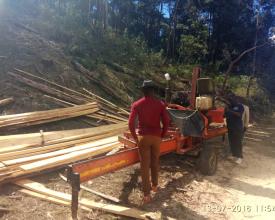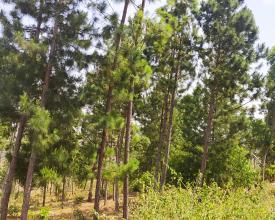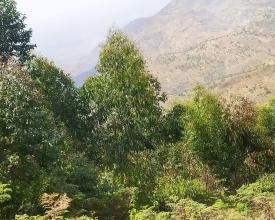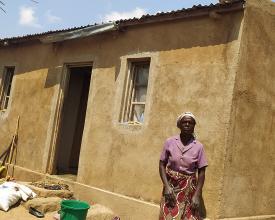
MTANDA COMMUNITY IN NTCHEU RESTORES 28 HECTARES AMID ECONOMIC TRANSFORMATION
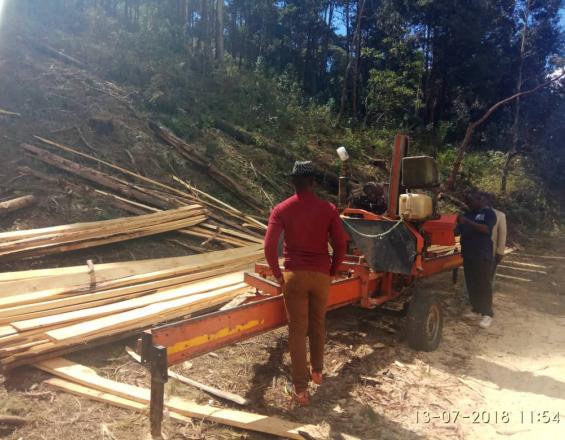
Local communities face multiple challenges to afford basic needs. Income generating activities at local level are difficult to identify and manage due to limited financial resources among the rural communities. Mtanda Community (399 female, 53 male) in Ntcheu District, Central Malawi identified plantation growing as a way to restore the degraded land and as a source of income. To effectively execute the plan, the community mobilized itself at clan level. The ten clans restore 27.5 ha with pine and eucalyptus species. The land used to be bare but has been under cover since the start of the initiative in 2006. So far the community has made three harvests from 2016 to 2020 realising a range of MK5 million (USD4,850) to MK16 million (USD15,519). These proceeds have been used to improve households such as pay school fees, build decent homes, and start other income generating activities.
Context
Challenges addressed
To strike a balance between natural resources conservation and income generating from plantations have been a challenge for most communities in Sub-Saharan Africa. Most cases have been associated with the encroachment of natural forests for charcoal or poles. There has been limited endeavors on the use of plantations as source of income and environmental conservation. Current paradigm suggests that plantations be encouraged among rural populations as incentives for conservation and income generation.
Location
Process
Summary of the process
The use of the clans have brought social cohesion among the community members. The clan headsbeing representative of the clan in the main committee have the responsibility to report about the performance of the clans in participation in activities and livelhood advancement. This has led to creation of a positive competition among the community clans and increased advancement in terms of livelihood improvement
Building Blocks
Clan approach
To prevent conflict the community divided itself into clans. Each clan manages its portion of the plantation. The heads of the clans comprise the executive committee. The community uses unform work plan to emsure activities are done timely. The approach has led zero conflicts and smooth running of the plantation business.
Enabling factors
Social cohesion
existing relationships
Lesson learned
Caln approach reduces conflicts among community memebrs on a common resource
Reliance on fellow relations leading to continuity of the activities
Livelihood focus
The community members developed their vision journeys to systematically track use of the benfits. This allowed members to use the proceeds for their desired purposes. For example building decent houses
Enabling factors
Extnsion workers assisting community on visioning
Lesson learned
Prior formaulation of Vision journeys ensure community achieve desired goals
Community monitoring of individual performance encourages members
Impacts
The plantation is on hilly landscape with steep slopes. Before the plantation, the area was heavily degraded, bare and experienced high soil loss through runoff. After establishing the plantation, the area has reduced runoff and land has been reclaimed where gullies developed. The area has become a habitat to some bird species, reptiles and soil fauna. The initiative brought about community cohesion among the community members through their day to day engagement in the activities. This has led to reduced disputes and has created more trust among community members. From business point of view, the community has managed to harvest logs three times. The first harvest was done in 2016 in which 421 logs were sold and realized MK5,052,000.00 (USD4,850). In their second harvest in 2018, the community sold 1,120 logs and yielded MK13,440,000.00 (USD12,609). The third harvest in 2020, yielded MK15,600,000.00 (USD15,519). The proceeds from these sales have been used to improve asset ownership at household level. For example, households have able to buy livestock suck as goats, pigs and chickens. Mtanda Community consists of 452 members of which 399 are female and 53 male with 30% youth. These members come from 101 households.
Beneficiaries
Human population in the country
Environment in Ntcheu
Global human population through carbon sequestration
Sustainable Development Goals
Story
Living in grass thatched house was never thought to become history for Mtisunge Tobias Of Golovera Village, Ntcheu District Central Malawi. He never wished rainy existed. He cursed those birds singing as harbinger for the rainy season. The house could leak and it was difficult to fine enough thatching grass. Ten years of leaking house was not unlike being homeless.
One day, a fellow village came to Tobias’s home. Tobias never thought it signaled road to a new house. He thought the friend brought usual news of how prepared he was for the upcoming weekend soccer. His friend John, said, ‘We had a meeting with these other friends, we intend to venture into plantation establishment but we need to be more.’ Mtisunge did not understand this at first word. John repeated.
A month after this conversation, Mtisunge found himself a member of a clan that ventured into plantation management. He joined with a precise vision, to build a decent house. He developed his Vision Journey (Masompheya). After 12 years, Mtisunge bought iron sheets for his new 3 bed room house. He now wishes all seasons were rainy seasons so that he intensifies his agricultural production. What used to be cursed is what has become a friend. Mtisunge says the idea to establish the plantation with aim to conserve the environment and generate income should be the way to for rural populations at a time when encroachment into protected forest reserve is at peak. The proceeds from plantations have made Mtisunge to have a better house and ad capital for agricultural production.
